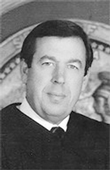California church that axed gay cleric is susceptible to civil litigation
A bitterly divided California appeals court ruled on May 27 that a minister dismissed for being gay could sue a church for “outing” him to the congregation and telling congregants that he had repeatedly lied about his sexual orientation.
A trial judge had originally dismissed the case, finding the church immune from suit under a traditional “ministerial exception” that protects religious institutions from liability for speech concerning personnel matters. A majority of the three-judge panel ruled that letting Robert Gunn’s lawsuit go forward would not necessarily violate the free exercise of religion by the elders of Mariners Church.
Gunn’s complaint identifies him as a long-time employee of the Orange County church, first as a part-time piano player and later as “worship director” and a full-time minister. According to Gunn, he never told anybody at the church that he was gay. He said he was never questioned about his sexuality, had “lived an ordinary private life” and had “never made any public statement about his sexual orientation.”
But in October 2001, the church, in a manner never explained in the ruling, learned that Gunn is gay. At that the church elders quickly dismissed him and told the church staff and then the congregation, from the pulpit during Sunday worship services, why Gunn had been discharged.
According to Gunn’s complaint, church leaders announced that he “had admitted to moral and sexual actions that are a sin” and that he had disqualified himself from leadership through a “breakdown” in “character.” Church officials also alleged that Gunn had been “caught in a sin,” that he was a “broken man who needed to be restored” and that “Gunn had been asked 40 or 50 times if he were gay and had lied and said that he was not.”
Gunn asserted that these statements were not only defamatory and untrue, but also a violation of his right to privacy because they unnecessarily broadcast his gay identity to the entire congregation without his authorization.
Gunn brought suit in Orange County Superior Court, alleging defamation and invasion of privacy and that the Mariners Church’s theology was not officially homophobic, but that the elders who fired him were homophobes who sought to justify their action with Biblical references.
The defendants filed a motion to dismiss the case, claiming protection under both the First Amendment’s religious freedom provision and the well-established ministerial exception from liability applicable to statements made from the pulpit.
Superior Court Judge Steven Perk agreed with the church’s argument and Gunn appealed.
Writing for the appeals court, Judge Kathleen E. O’Leary agreed with Perk’s conclusion that statements by elders regarding Gunn’s “sinful” behavior raised theological issues that the court should steer clear of. But, O’Leary found that the disagreement over whether Gunn had been asked repeatedly if he were gay and had lied had nothing to do with theology. She similarly ruled that Gunn’s assertion that his privacy had been violated was also a civil, not religious, issue. O’Leary found that on these questions, Gunn’s claims could not be dismissed on summary judgment, since more facts would have to be developed at trial.
O’Leary did conclude that the other assertions made about Gunn by church officials were protected by ministerial exception. Courts have generally held that churches and other religious institutions may be held liable for injuring others, except when such action relates to internal church governance involving matters of theology.
Judge David G. Sills’ lengthy, sometimes sarcastic dissenting opinion argues in great detail that the majority of the court erred, reasoning that any inquiry into statements church officials made about Gunn necessarily involve questions of church governance inappropriate for judicial review. A lengthy portion of his dissent focused on the difficulty of defining “homophobia,” and the inevitable problems a court would encounter in untangling Gunn’s claim that the church itself was not homophobic but the officials who dismissed him were.
Departing from normal practice, O’Leary specifically criticized Sills’ dissent, asserting, “We chose not to exploit the facts of this case to create a bully pulpit… Notwithstanding our dissenting colleague’s gratuitous inflammatory rhetoric, the sky is not falling.”
gaycitynews.com



































